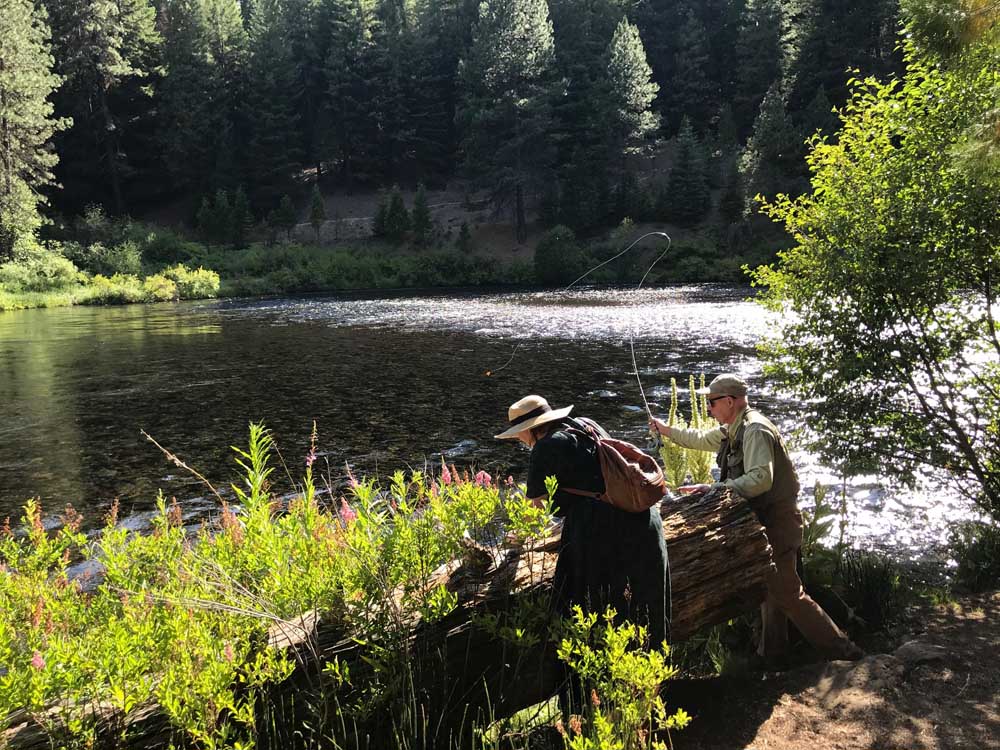Metolius River offers variety of adventure
Published 5:00 am Friday, July 17, 2020

- A fly angler, right, makes a cast on the Metolius River while a friend looks on.
CAMP SHERMAN — The Metolius River has become our family’s go-to camping location over the past several years.
At least once each summer, we make the 45-minute-or-so trip northwest from Bend to spend a couple of nights camping alongside the crystal-clear, spring-fed water of the mighty Metolius.
Until recently, I rarely made a reservation. I could usually count on landing a first-come, first-served spot on one of the 11 Deschutes National Forest campgrounds on the river.
But the past couple years, more and more sites are reserved, and more and more folks seem to have found the joys of camping — especially this summer, when everybody wants to get outside and escape the housebound days of the coronavirus pandemic.
So luckily, I was able to make a reservation on recreation.gov for two nights at Lower Bridge Campground about a week ahead of the trip.
Those fortunate enough to secure a campsite on the Metolius can treat themselves to a seemingly endless list of outdoor adventures including fly-fishing, hiking, mountain biking, paddling and wildlife viewing.
My 12-year-old son Mason and I set out for much of that this past weekend.
Lower Bridge is one of the last campgrounds on the Metolius, along Road 14, before the north-flowing river makes its final push into Lake Billy Chinook.
After setting up the tent and getting settled, we explored our surroundings. Lower Bridge is a relatively busy area on the Metolius, a favorite for fly anglers who test the deep pools for hefty bull trout and kayakers who frolic in the fast-moving water.
Anglers lined the shore here and there, as did we. We had no luck after a few hours of fishing, but the Metolius is a notoriously difficult river to fish. Still, we looked on with a bit of jealousy as a couple of other anglers netted and released sizable rainbow trout.
Several kayakers practiced their freestyle moves near the bridge, turning and flipping in the numerous rapids and eddies.
After an evening of cornhole games, burgers on the camp stove and chocolate cookies (Mason can’t have s’mores because of his braces, which was a tough pill to swallow on a camping trip), we settled in for a slumber in the tent.
The plan for the next day was a mountain bike ride along remote Green Ridge, which rises above the entire river just to the east. Because many of the trails that line the Metolius are open only to hikers and runners, cyclists who camp on the river need to get a little creative to find their routes.
But the area is a gravel rider’s paradise, with countless gravel and dirt roads that branch out west from the river toward the Cascade Range.
The Green Ridge Trail is one stretch of singletrack that I had yet to sample in Central Oregon.
After a hearty camp stove breakfast of thick-cut bacon and eggs, we drove Road 14 south, then made a left on Road 1120, which after a few miles took us to the south terminus of the trail, just north of Black Butte.
It was a tough climb along the ridgeline, but we enjoyed views of Mount Washington, Three Fingered Jack and Mount Jefferson. We even saw a wild turkey just a few feet off the trail, as Green Ridge is home to Central Oregon’s largest turkey population.
The trail extends 10 miles along the ridge, but we were bushed and turned around after 5 miles, making for a 10-mile round trip ride that included nearly 1,000 feet of elevation gain.
On the descent back to the trailhead, we encountered four horseback riders and quickly pulled to the side of the trail. Bikers should make sure to yield to equestrians along the trail.
Back at the campsite, we wasted away the day by fishing, playing cornhole and simply exploring the pristine beauty of the Metolius. On a short hike downstream, the river turned into a series of beautiful rapids, near where Abbott Creek, Candle Creek and Jefferson Creek all flow into it.
The stars were spectacular that night, the cloudy band of the Milky Way visible above the ever-flowing, ever-peaceful sound of the river.








